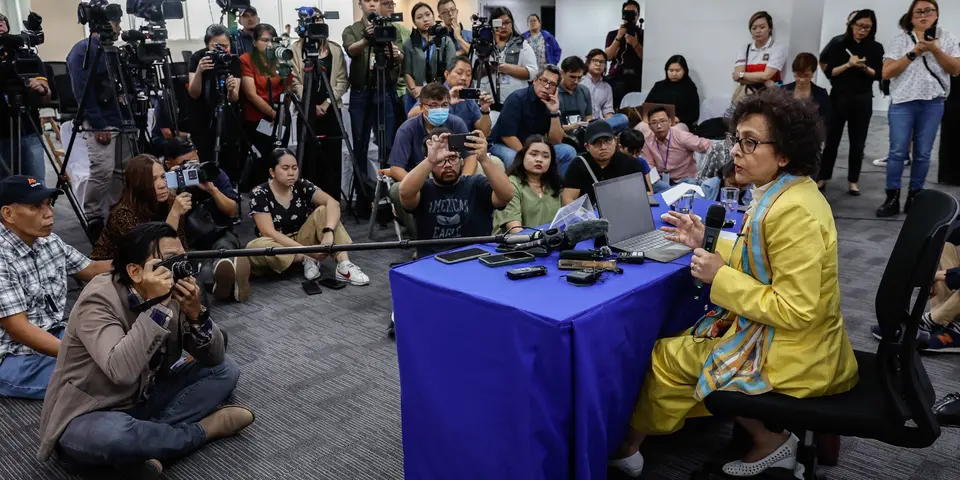
APHR to Marcos Administration: End Red-Tagging, Free Human Rights Defenders, Act on UN Recommendations Now
June 19, 2025

JAKARTA, 19 JUNE 2025—ASEAN Parliamentarians for Human Rights (APHR) reaffirms the UN Special Rapporteur on Freedom of Expression, Irene Khan’s report on her 23 January to 2 February 2024 visit to the Philippines.
The report recognizes the courage and resilience of Filipino journalists, human rights defenders and civil society, but it also confirms what many in the region already know: that these groups remain under serious threat and that the government has yet to implement the fundamental reforms necessary to guarantee freedom of expression and end impunity for human rights abuses.
“This is not only a matter of domestic concern, but a test of the Philippines’ commitments under ASEAN and international human rights conventions. APHR therefore calls on the Marcos administration to act without delay on these critical recommendations,” manifested Maria Angelina Sarmento, APHR Board Member and Member of Parliament of Timor-Leste.
Despite the Supreme Court’s May 2024 ruling that red-tagging poses a grave threat to life, liberty and security, the Philippine government has failed to take decisive action or enforce policies to eliminate this often deadly practice.
Mercy Chriesty Barends, APHR Chairperson and Member of the House of Representatives of Indonesia recounted, “rather than issuing a comprehensive executive order or revising decrees to explicitly prohibit vilification campaigns against critical voices, state‑sponsored smear tactics through the National Task Force to End Local Communist Armed Conflict (NTF ELCAC) and its other subsidiaries continue to be unchecked.”
“Without swift and binding measures to dismantle red-tagging and hold perpetrators to account, every day we continue to witness new victims denied both justice and due process,” Barends added.
Representing a network of policymakers standing for rights-holders in the parliament, APHR honors Irene Khan’s recommendations. The Philippine government must abolish the NTF ELCAC, whose red-tagging operations have precipitated enforced disappearances, extrajudicial killings and dubious cases against human rights defenders, journalists and civil society.
Rangsiman Rome, APHR Board Member and Member of Parliament of Thailand zooms in on the prolonged detention of community journalist Frenchie Mae Cumpio and church workers Mariel Domequil and Alexander Abinguna arrested in simultaneous raids in Tacloban City in 2020, “after more than four years behind bars on clearly fabricated charges, their continued detention is downright unjust. We endorse the UN Special Rapporteur’s call for authorities to release them and ensure no one else suffers this kind of abuse in the future.”
APHR urges the Philippine Congress to prioritize House Bill 77 or the Human Rights Defenders Protection Act. This legislation would lay down safeguards for all defenders, including those protecting the environment and indigenous communities, ensuring they can carry out their work free from intimidation or violence.
Reforming the legal environment is equally critical. The criminalization of libel under Articles 353–357 of the Philippine Revised Penal Code and the Cybercrime Prevention Act must be revoked. Likewise, the Anti-terrorism Act of 2020 requires repeal or substantial amendment to prevent its misuse against peaceful dissent.
Structural reform must also be extended to the Philippine Mining Act of 1995, whose broad concessions have frequently endangered land rights and environmental integrity. We therefore propose replacing it with legislation that mandates free, prior and informed consent, rigorous environmental impact assessments and enforceable penalties for non‑compliance.
In this light, Charles Santiago, APHR Co-Chairperson and former Malaysian Member of Parliament asserted, “in fully endorsing Irene Khan’s final report, APHR reiterates its commitment to stand with the Filipino people. Implementing these recommendations is not merely an exercise in compliance—it is a dedication to democratic resilience, social justice and regional credibility.” ###
ASEAN Parliamentarians for Human Rights (APHR) was founded in June 2013 with the objective of promoting democracy and human rights across Southeast Asia. Our founding members include many of the region's most progressive Members of Parliament (MPs), with a proven track record of human rights advocacy work.